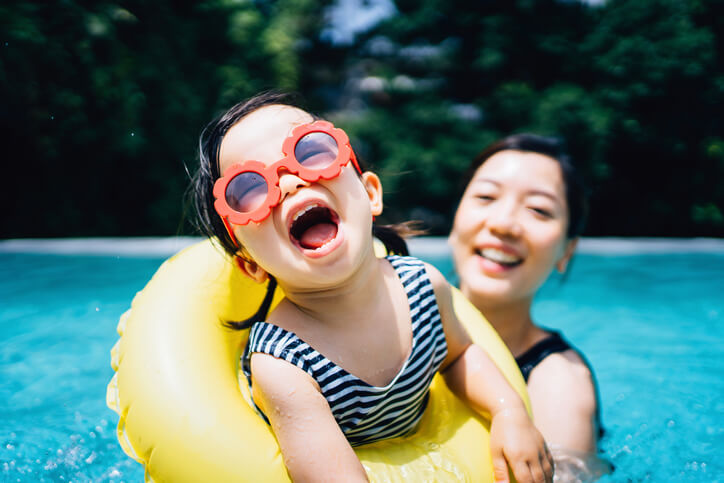Pool Safety Tips for Parents

Nearly 1,000 kids die every year from drowning. Of those, more than half are under the age of five. In fact, drowning is the leading cause of accidental death in children under 5, surpassing even traffic accident fatalities in recent years.
Maybe even more startling, for every child who dies from drowning, five more receive emergency care for nonfatal submersion injuries.
As summer activities hit full swing, families have reason to take extra caution: two-thirds of fatal drownings occur between May and August.
Follow these pool safety tips to help keep your children safe this summer.
- Supervise. Never leave children unattended in or around a pool. Designate an adult who can swim to be the “water watcher” and take turns filling that role. The “water watcher” should be undistracted. Children under age 4 should be supervised at arm’s length even if they know how to swim. Do not rely on floatation devices such as pool noodles, rafts, or floaties to keep kids safe.
- Teach kids to swim. The American Academy of Pediatrics reports that most children over the age of four can learn how to swim. Parents may decide to start swimming lessons before age 4 if their children are developmentally ready, but swim programs should never be seen as “drown-proofing” a child of any age.
- Be prepared for emergencies. Keep rescue equipment such as a shepherd’s hook (a long pole with a hook on the end) a life preserver and a cell phone near the pool in the event of an emergency. Parents, caregivers, and anyone who spends a significant amount of time around children should know CPR. Register for a CPR class near you.
- Establish and enforce pool rules. Teach your children basic safety rules such as no one swims alone, stay away from drains, no running and no diving (if appropriate).
- Fence it in. Install a four-foot or taller fence around your pool and use self-closing and self-latching gates. The latches should be out of the reach of young children. If your house is the fourth side of a barrier, secure doors with alarms that prevent children from wandering into the pool area.
- Avoid alcohol. Don’t drink alcohol when you are boating, swimming, or supervising children who are in or near water. Teach alcohol awareness to teens, especially boys. Inform teenagers about the increased risk of drowning when alcohol or drugs are involved. Because teenage boys are at much higher risk of water-based injuries than girls, they warrant extra counseling.
- Take extra precautions with above ground or inflatable pools. Remove access ladders and secure the safety cover whenever the pool is not in use. Empty inflatable or kiddie pools after each use.
- Remove temptation. Never leave toys in the pool while not in use. A child could fall in attempting to retrieve them.
- Suit up. Have children wear a U.S. Coast Guard-approved life jacket. Do not rely on water wings or inflatable toys.
Next Steps and Useful Resources:
Sign up for a CPR Class Near You
Hands-Only CPR and When to Use It
Avoid Summertime Emergencies
Find a Provider



